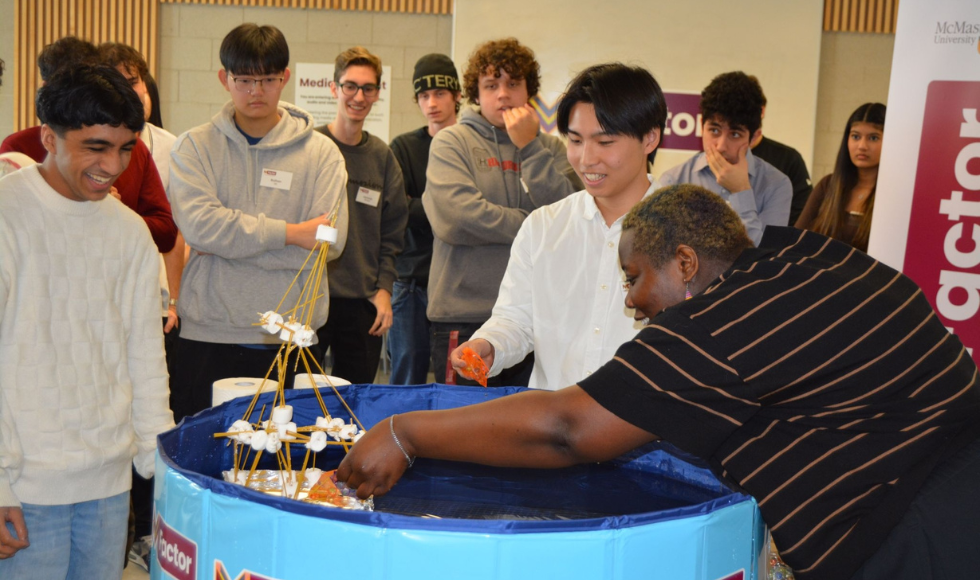M-Factor makes its mark: A weekend of competition builds confidence and connection for engineering students

Students build a structure out of marshmallows and uncooked spaghetti.
Picture this: 25 engineering students, $6,000 in cash prizes and challenges designed to push them outside their comfort zones. This was the scene at the weekend-long M-Factor competition that took place on campus at the end of January.
The W Booth School of Engineering Practice and Technology in the Faculty of Engineering at McMaster University designed M-Factor to provide students with a competitive, experiential learning opportunity that challenges participants to develop leadership, adaptability, and problem-solving skills in real-world scenarios.
For Jasmine Smith, a fourth-year Electrical Engineering and Society student, M-Factor was a turning point in her McMaster Engineering experience. “I’ve always doubted myself,” she admitted. “Winning? That was the last thing I expected.”
After three days of problem-solving, improvisation, and teamwork judged by Faculty of Engineering alumni, McMaster community representatives and industry leaders, Smith emerged as the champion, taking home $3,000. Naomi Dover, a third-year BTech Biotechnology student, secured second place winning $2,000, while Yash Dubey in his final year of BTech Automation Systems Engineering Technology finished third, taking home $1,000.
The vision behind M-Factor
The competition was spearheaded by W Booth School professors Hoda Kamel, Allan Mackenzie and Mike Justason, who envisioned an experiential learning opportunity that extended beyond the classroom.
“Being a great engineer is about more than just technical skills,” said Mackenzie, who was part of the original M-Factor planning team when it first launched in 2015. “It’s about students developing their communication and adaptability skills, which in turn builds confidence in high-pressure situations.”
A weekend of challenges
Each challenge was designed to assess students’ leadership and critical thinking skills including an improv exercise, a team-based construction challenge and a case study on the Learning Factory – a world-class facility that simulates the factory of the future located in the basement of the Engineering Technology Building.
The final Media Encounter Challenge put them in the hot seat, simulating a high-stakes press conference where participants had to defend business decisions like seasoned executives.
Rising to the occasion
For Schlok Panchal, a second-year Biomedical Engineering and Health Sciences student, M-Factor was an opportunity to grow beyond the classroom. “It was a fun, proactive competition,” he said. “It really pushed me out of my comfort zone and the soft skills I developed will help me pursue my career in the medical field. I’m so grateful to have been part of the M-Factor experience.”
Yash Dubey, who placed third and won $1,000, also found the experience invaluable. “I gained confidence in my abilities, strengthened my leadership and presentation skills, and built valuable connections with peers and industry professionals,” he said.
Professor Hoda Kamel was impressed by how students adapted to the intense challenges. “I saw a completely different side of them,” she said. “They pushed themselves, demonstrated creativity and built resilience that will serve them throughout their careers.”
For Jasmine Smith, the experience was transformative. “The $3,000 prize wasn’t just about the money—it’s allowing me to meet my grandfather in Spain for the first time,” she said. “But beyond that, I gained confidence I never had before.”
Real-world lessons in engineering management
The challenges tested a range of essential engineering management skills. “M-Factor forced us to trust our instincts, communicate effectively and make decisions on the fly,” said Smith. “I’m used to carefully planning everything, but this competition made me realize the power of adaptability.”
The competition judges echoed this sentiment. Candice Chow, Assistant Professor of Strategic Management at the DeGroote School of Business, emphasized the competition’s relevance to industry demands.
“The ability to think on your feet is critical in today’s professional world,” she said. “M-Factor challenges students to anchor their decisions on core values and think strategically under pressure.”
Scott Neinhurst, Director of IT at Rowan Williams Davies and Irwin Inc (RWDI) and a McMaster Software Engineering graduate, praised students for their ability to deliver results under time constraints. “They weren’t just problem-solvers,” he said. “They were innovative thinkers, tackling real-world issues with impressive energy and enthusiasm.”
Beyond skill-building, the competition fostered a sense of camaraderie. “Despite competing against each other, the students were incredibly supportive,” said Dover, second-place winner. “We all wanted to see each other succeed.”
The weekend’s impact was undeniable: M-Factor transcends being just a competition—it’s a transformative journey that molds future engineering leaders. As McMaster Engineering continues to nurture these opportunities, one thing is clear: the next generation of innovators is already leaving its mark.

